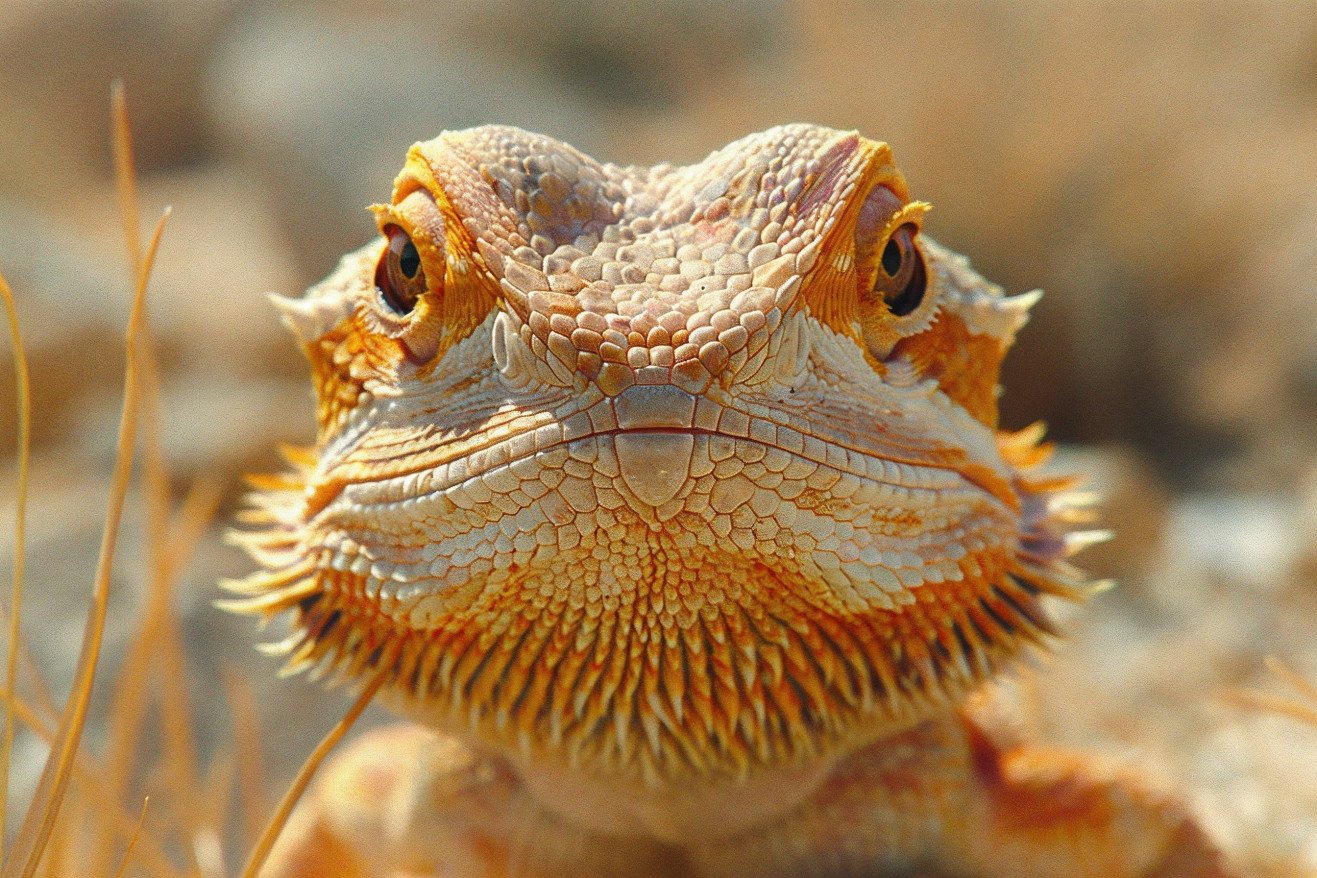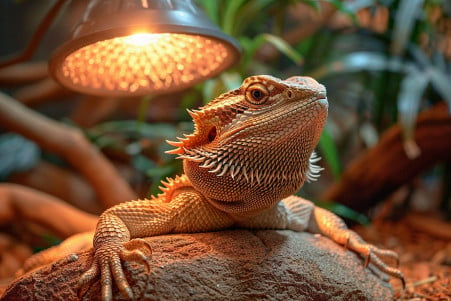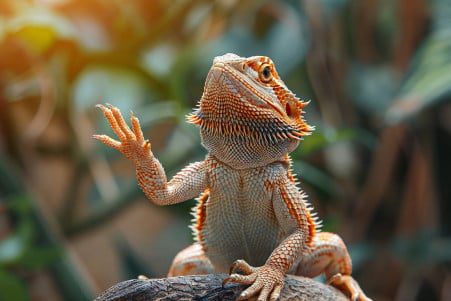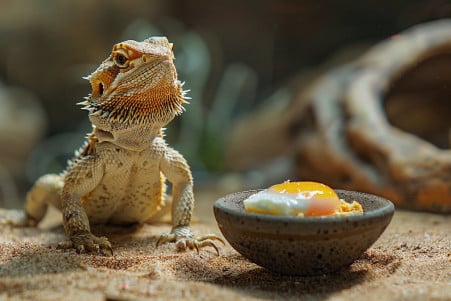Bearded Dragon Bulging Eyes: Causes, Treatments, and Expert Advice
15 April 2024 • Updated 13 April 2024

While the bulging eyes and wide, rectangular pupils of bearded dragons are normal, there are times when these traits can signal a health problem that needs to be addressed by a veterinarian. Dehydration, infection, vitamin deficiency, and more serious issues like metabolic bone disease or head trauma can all lead to bearded dragon bulging eyes, so it's important to understand what's causing the problem so that you can help your pet get the care it needs.
This article will cover the potential causes and treatments for bearded dragon bulging eyes by looking at the scientific literature published by reptile vets and herpetology experts. By taking a research-based approach, this article will help you understand what to look for, what the bulging eyes may mean, and what kind of dietary, habitat, or medical changes you may need to make to help your beardie's eyes return to normal.
What causes bearded dragon eyes to bulge?
Causes of Bearded Dragon Eye Bulging
Shedding is a common cause of temporary eye bulging in bearded dragons, especially in younger dragons that shed more frequently. According to one of the more predominant theories, bearded dragons bulge their eyes to loosen the skin around the eyes in preparation for shedding. Another belief is that they do this as a form of "yawning" to stretch the eye area during shedding periods.
However, high blood pressure can also lead bearded dragons to intentionally increase pressure behind their eyes as a defense mechanism, resulting in bulging. Other causes of swollen or protruding eyes include dehydration, vitamin A deficiency, parasites, and eye infections. Environmental factors like incomplete shed, mites, foreign bodies, or trauma can also lead to eye bulging and swelling in bearded dragons.
It's important to determine the cause of the issue so that the appropriate treatment can be administered and complications can be avoided. While temporary eye bulging during shedding may be normal, if the swelling is persistent or gets worse, it's important to have the issue evaluated to rule out more serious health problems.
How to Keep Your Bearded Dragon's Eyes Healthy
Setting up and maintaining the right habitat is essential for preventing eye problems in bearded dragons. As explained by PetMD, this includes making sure that bearded dragons have the right kind of lighting, including UVB and basking lamps, to provide the right kind of light and help the dragons absorb calcium. The article also explains that using a substrate that is both safe and easy to clean and keeping the habitat clean can help prevent infections and other issues.
As mentioned in the JustAnswer discussion, it's also important to make sure that bearded dragons are eating a well-balanced diet that includes plenty of nutrients, including vitamin A, to prevent deficiencies. In addition, taking bearded dragons for regular veterinary check-ups can help catch and treat eye issues before they become serious, as pointed out by VCA Animal Hospitals.
With the right habitat, diet, and preventive care, bearded dragon owners can help ensure that their pets' eyes stay healthy. However, if problems do occur, it may be important to seek veterinary care to treat any underlying issues and prevent complications.
How Bearded Dragon Eye Infections and Injuries Are Treated
If an eye infection or injury is suspected in a bearded dragon, it is important to seek veterinary care right away to avoid further complications, according to the Merck Veterinary Manual. While mild eye infections can be treated with antibiotic eye drops or ointments prescribed by a veterinarian, as well as supportive care such as saline rinses, Beardie ER points out that vitamin A supplements may be needed if a vitamin A deficiency is causing the eye problem.
More serious infections may require oral antibiotics or antifungal medications to treat the underlying cause, according to VCA Animal Hospitals. Meanwhile, the Merck Veterinary Manual explains that in cases of trauma or severe swelling, surgery may be needed to drain abscesses or remove foreign bodies.
Because of this, it is important to see a veterinarian as soon as possible if you suspect your bearded dragon has an eye infection or injury. This will help ensure the problem is properly diagnosed and treated, and can prevent long-term issues from arising.
Potential Risks of Untreated Eye Conditions in Bearded Dragons
If left untreated, eye conditions that cause bulging or swelling in bearded dragons can result in a number of complications and long-term health problems. According to the Merck Veterinary Manual, eye infections or injuries that are not treated can lead to abscesses or tissue necrosis. Meanwhile, the VCA Animal Hospitals article explains that chronic eye conditions can cause vision problems or blindness if they are not taken care of.
In addition, if the underlying issue that is causing the bulging in the eye is not treated, conditions like metabolic bone disease or kidney disease can get worse. For example, as explained in the Veterinary Partner article, the combination of a poor thermal environment and slow kidney metabolism can lead to kidney disease in reptiles, which can make eye conditions worse.
It is important to get the bearded dragon to a veterinarian as soon as possible to prevent long-term damage and ensure the animal's overall health. Early intervention and appropriate treatment can help prevent long-term issues and help the animal maintain its health and quality of life.
When to See a Vet for Bearded Dragon Eye Problems
According to VCA Animal Hospitals, if a bearded dragon's eyes look swollen, bulging, or abnormal in any way, it's important to consult a veterinarian as soon as possible. If the eye problems persist for more than a day or two or get worse, it's time to see a reptile vet, according to the wikiHow article.
If there are any signs of discharge, discoloration, or the eye is still shut after a few days, it's time to take the bearded dragon to the vet, says VCA Animal Hospitals. If the bearded dragon is also showing other symptoms like lethargy, loss of appetite, or strange behavior, it's time to go to the vet.
Regular veterinary visits can help catch potential eye problems before they become more serious, says VCA Animal Hospitals. By being vigilant and seeking medical attention when necessary, bearded dragon owners can help ensure their pet's eyes stay healthy and free from long-term issues.
Conclusion: How to Keep Your Bearded Dragon's Eyes Healthy
Bulging or swollen eyes in bearded dragons can be caused by a variety of factors, ranging from temporary shedding to more serious underlying health issues. Prompt identification of the root cause and appropriate treatment are crucial for preventing long-term complications and ensuring the pet's well-being.
Proper habitat setup, nutrition, and regular veterinary care are essential for maintaining healthy eyes and overall health in bearded dragons. By understanding the potential causes, recognizing concerning symptoms, and seeking professional advice when needed, owners can help their beloved beardies thrive.
With the right knowledge and care, bulging eyes in bearded dragons can be effectively managed, and these fascinating reptiles can continue to delight their owners with their unique and captivating features.


